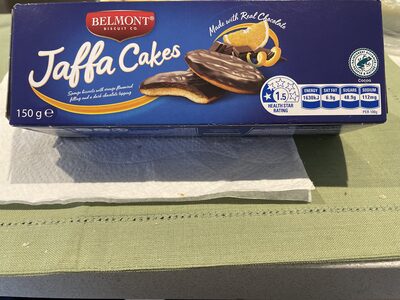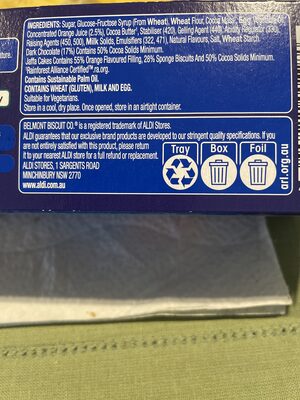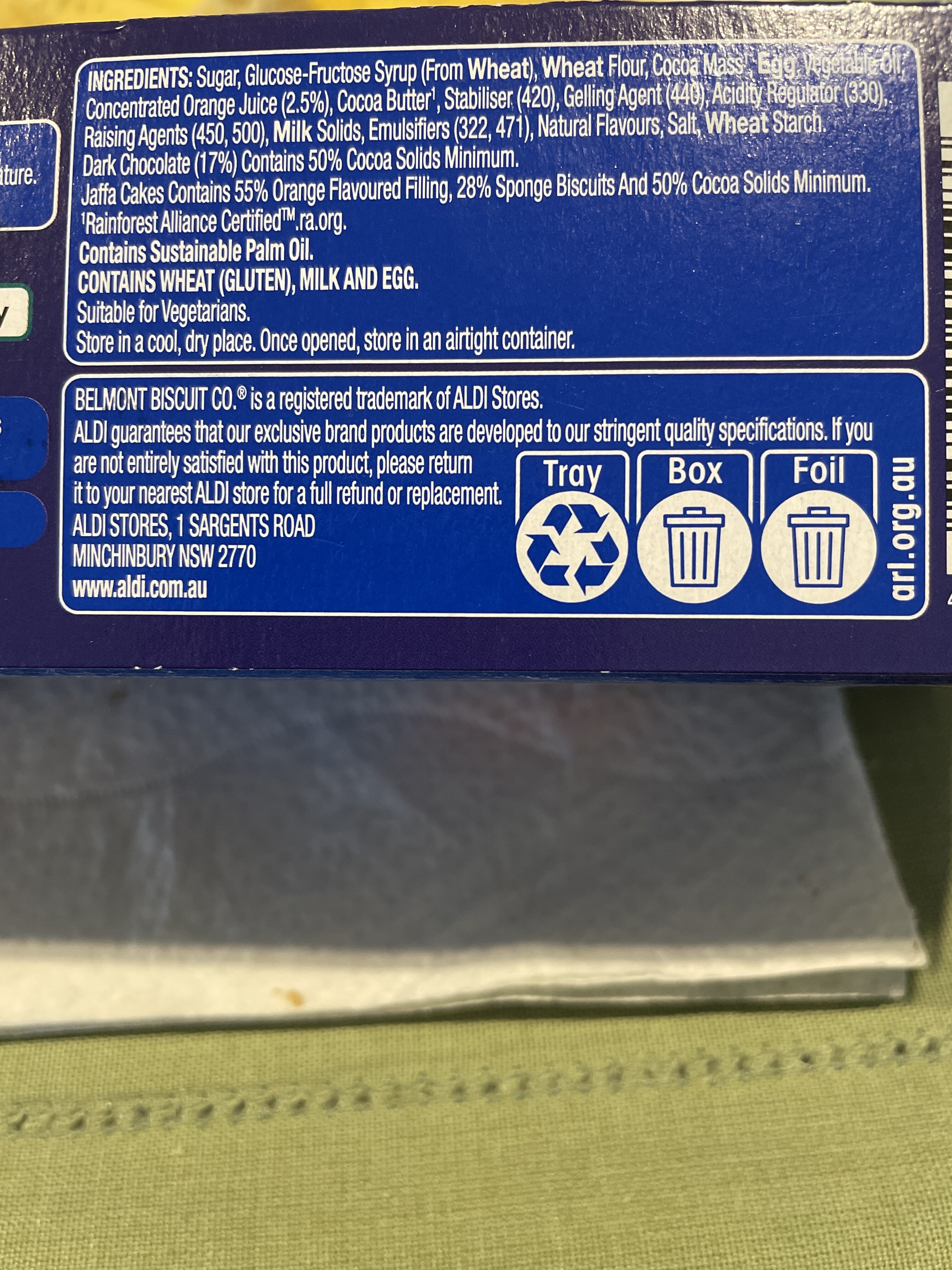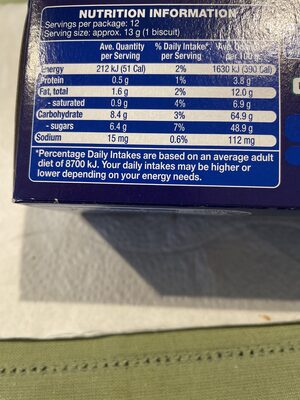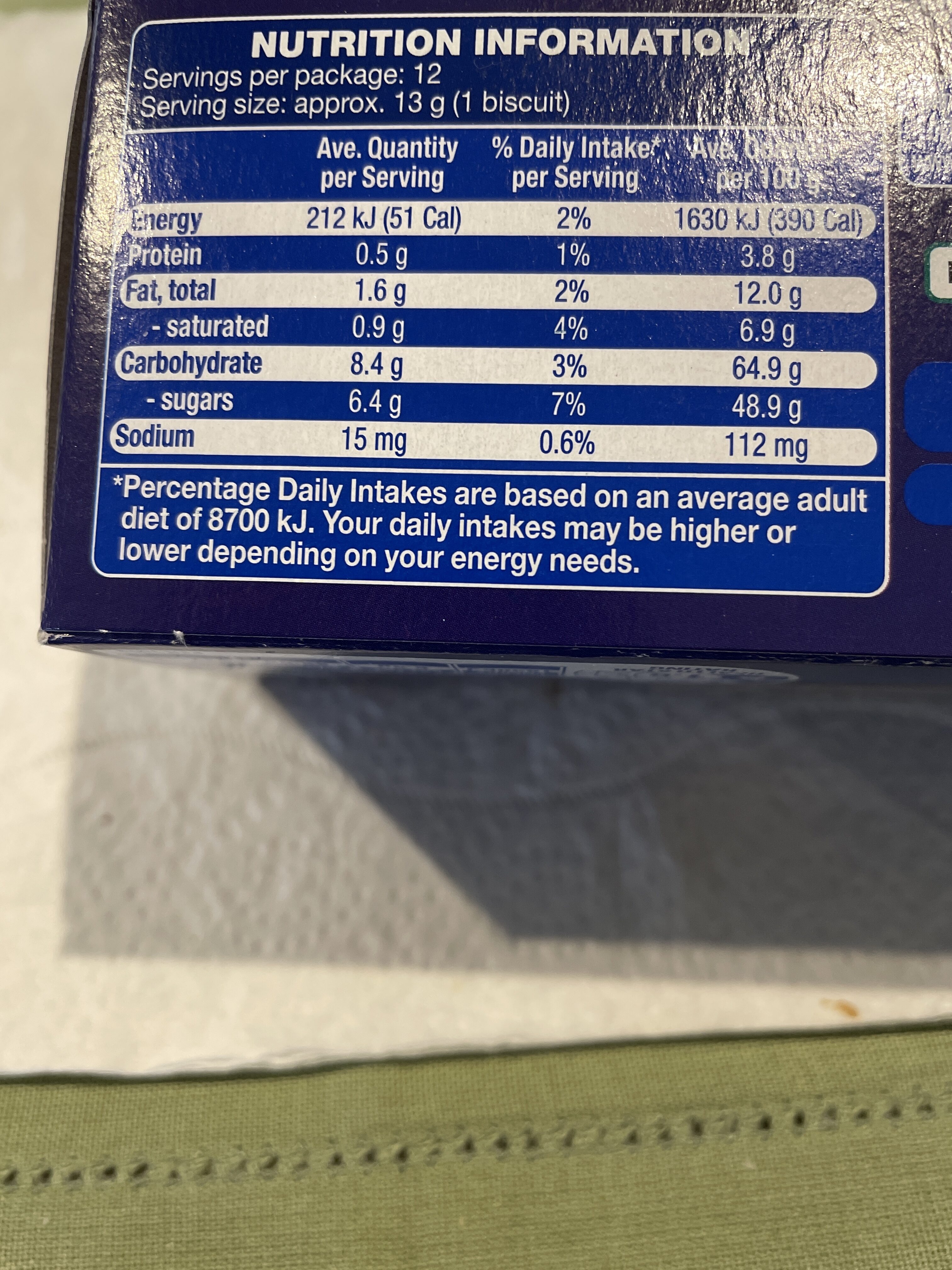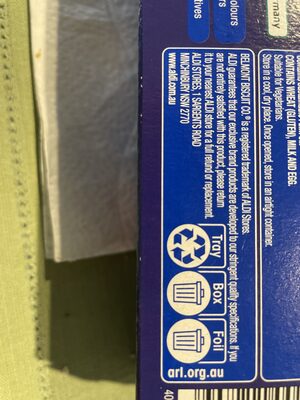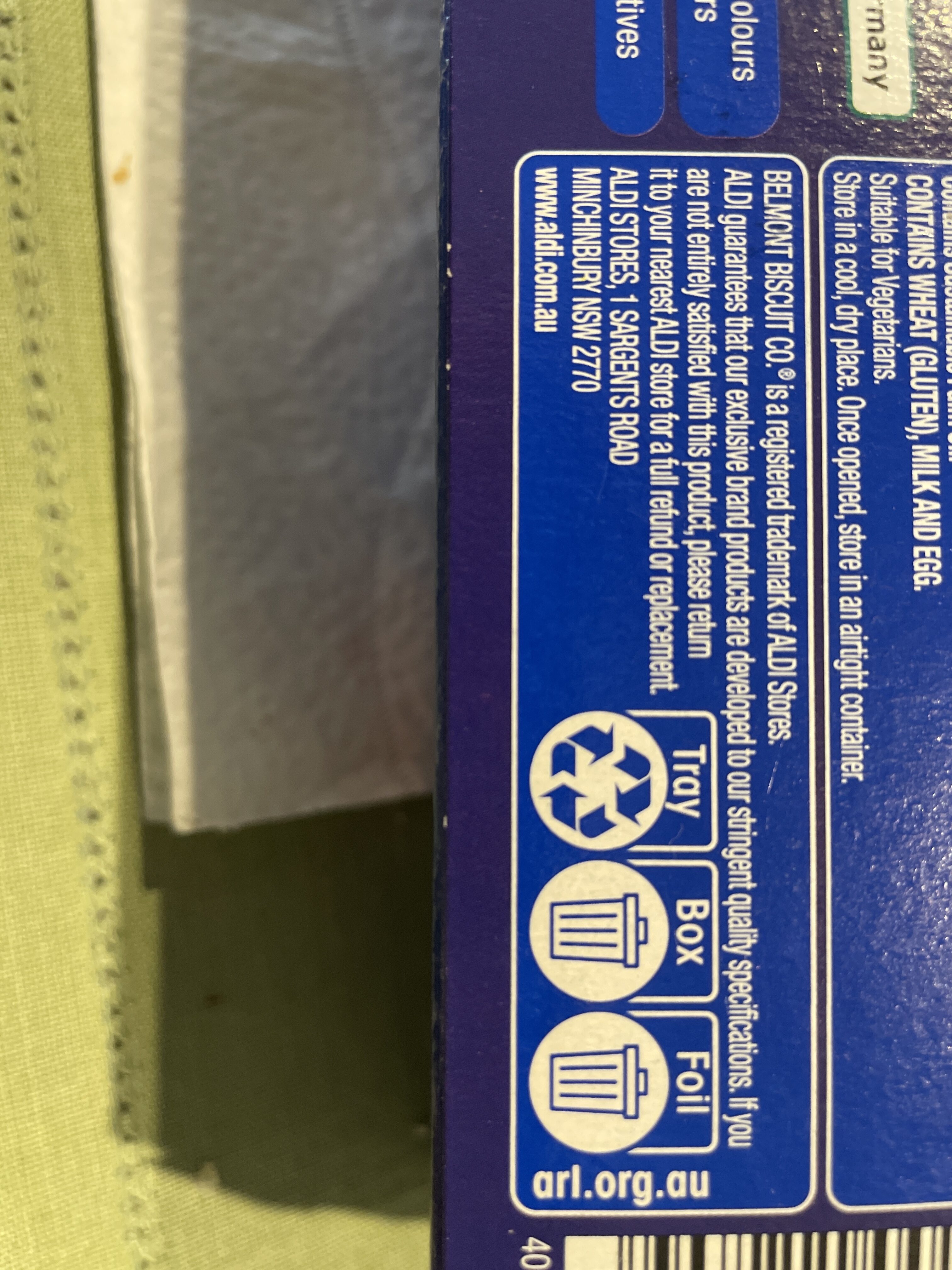Help us make food transparency the norm!
As a non-profit organization, we depend on your donations to continue informing consumers around the world about what they eat.
The food revolution starts with you!
Jaffa Cakes - Belmont - 150g
Jaffa Cakes - Belmont - 150g
Barcode: 4088700112809 (EAN / EAN-13)
Quantity: 150g
Packaging: Cardboard box
Categories: Snacks, Sweet snacks, Biscuits and cakes, Biscuits, Chocolate biscuits, Jaffa cakes
Labels, certifications, awards: Sustainable, Vegetarian, Sustainable Palm Oil
Origin of ingredients: Germany
Stores: Aldi
Countries where sold: Australia
Matching with your preferences
Health
Ingredients
-
32 ingredients
Sugar, Glucose-Fructose Syrup (From Wheat), Wheat Flour, Cocoa Mass Sog Vegetall oli Concentrated Orange Juice (2.5%), Cocoa Butter', Stabiliser (420), Gelling Agent (440), Acidity Regulator (330), Raising Agents (450, 500), Milk Solids, Emulsifiers (322, 471), Natural Flavours, Salt, Wheat Starch. Dark Chocolate (17%) Contains 50% Cocoa Solids Minimum. ature. Jaffa Cakes Contains 55% Orange Flavoured Filling, 28% Sponge Biscuits And 50% Cocoa Solids Minimum. "Rainforest Alliance Certified™M.ra.org. Contains Sustainable Palm Oil. CONTAINS WHEAT (GLUTEN), MILK AND EGG. Suitable for Vegetarians.Allergens: Eggs, Gluten, Milk
Food processing
-
Ultra processed foods
Elements that indicate the product is in the 4 - Ultra processed food and drink products group:
- Additive: E322 - Lecithins
- Additive: E420 - Sorbitol
- Additive: E440 - Pectins
- Additive: E450 - Diphosphates
- Additive: E471 - Mono- and diglycerides of fatty acids
- Ingredient: Emulsifier
- Ingredient: Flavouring
- Ingredient: Gelling agent
- Ingredient: Glucose
Food products are classified into 4 groups according to their degree of processing:
- Unprocessed or minimally processed foods
- Processed culinary ingredients
- Processed foods
- Ultra processed foods
The determination of the group is based on the category of the product and on the ingredients it contains.
Additives
-
E322 - Lecithins
Lecithins are natural compounds commonly used in the food industry as emulsifiers and stabilizers.
Extracted from sources like soybeans and eggs, lecithins consist of phospholipids that enhance the mixing of oil and water, ensuring smooth textures in various products like chocolates, dressings, and baked goods.
They do not present any known health risks.
-
E330 - Citric acid
Citric acid is a natural organic acid found in citrus fruits such as lemons, oranges, and limes.
It is widely used in the food industry as a flavor enhancer, acidulant, and preservative due to its tart and refreshing taste.
Citric acid is safe for consumption when used in moderation and is considered a generally recognized as safe (GRAS) food additive by regulatory agencies worldwide.
-
E420 - Sorbitol
Sorbitol: Sorbitol --, less commonly known as glucitol --, is a sugar alcohol with a sweet taste which the human body metabolizes slowly. It can be obtained by reduction of glucose, which changes the aldehyde group to a hydroxyl group. Most sorbitol is made from corn syrup, but it is also found in nature, for example in apples, pears, peaches, and prunes. It is converted to fructose by sorbitol-6-phosphate 2-dehydrogenase. Sorbitol is an isomer of mannitol, another sugar alcohol; the two differ only in the orientation of the hydroxyl group on carbon 2. While similar, the two sugar alcohols have very different sources in nature, melting points, and uses.Source: Wikipedia
-
E440 - Pectins
Pectins (E440) are natural carbohydrates, predominantly found in fruits, that act as gelling agents in the food industry, creating the desirable jelly-like texture in jams, jellies, and marmalades.
Pectins stabilize and thicken various food products, such as desserts, confectioneries, and beverages, ensuring a uniform consistency and quality.
Recognized as safe by various health authorities, pectins have been widely used without notable adverse effects when consumed in typical dietary amounts.
-
E450 - Diphosphates
Diphosphates (E450) are food additives often utilized to modify the texture of products, acting as leavening agents in baking and preventing the coagulation of canned food.
These salts can stabilize whipped cream and are also found in powdered products to maintain their flow properties. They are commonly present in baked goods, processed meats, and soft drinks.
Derived from phosphoric acid, they're part of our daily phosphate intake, which often surpasses recommended levels due to the prevalence of phosphates in processed foods and drinks.
Excessive phosphate consumption is linked to health issues, such as impaired kidney function and weakened bone health. Though diphosphates are generally regarded as safe when consumed within established acceptable daily intakes, it's imperative to monitor overall phosphate consumption to maintain optimal health.
-
E471 - Mono- and diglycerides of fatty acids
Mono- and diglycerides of fatty acids (E471), are food additives commonly used as emulsifiers in various processed foods.
These compounds consist of glycerol molecules linked to one or two fatty acid chains, which help stabilize and blend water and oil-based ingredients. E471 enhances the texture and shelf life of products like margarine, baked goods, and ice cream, ensuring a smooth and consistent texture.
It is generally considered safe for consumption within established regulatory limits.
-
E500 - Sodium carbonates
Sodium carbonates (E500) are compounds commonly used in food preparation as leavening agents, helping baked goods rise by releasing carbon dioxide when they interact with acids.
Often found in baking soda, they regulate the pH of food, preventing it from becoming too acidic or too alkaline. In the culinary world, sodium carbonates can also enhance the texture and structure of foods, such as noodles, by modifying the gluten network.
Generally recognized as safe, sodium carbonates are non-toxic when consumed in typical amounts found in food.
Ingredients analysis
-
Palm oil
Ingredients that contain palm oil: Palm oil
-
Non-vegan
Non-vegan ingredients: Milk solids, Milk, EggSome ingredients could not be recognized.
We need your help!
You can help us recognize more ingredients and better analyze the list of ingredients for this product and others:
- Edit this product page to correct spelling mistakes in the ingredients list, and/or to remove ingredients in other languages and sentences that are not related to the ingredients.
- Add new entries, synonyms or translations to our multilingual lists of ingredients, ingredient processing methods, and labels.
If you would like to help, join the #ingredients channel on our Slack discussion space and/or learn about ingredients analysis on our wiki. Thank you!
-
Vegetarian
No non-vegetarian ingredients detected
Unrecognized ingredients: Cocoa-mass-sog-vegetall-oli-concentrated-orange-juice, 420, 440, 330, 450, 500, 322, 471, Contains-50-cocoa-solids-minimum, Ature, Jaffa-cakes, Contains-55-orange-flavoured-filling, Sponge-biscuits-and-50-cocoa-solids-minimum, Rainforest-alliance-certified-m-ra-orgSome ingredients could not be recognized.
We need your help!
You can help us recognize more ingredients and better analyze the list of ingredients for this product and others:
- Edit this product page to correct spelling mistakes in the ingredients list, and/or to remove ingredients in other languages and sentences that are not related to the ingredients.
- Add new entries, synonyms or translations to our multilingual lists of ingredients, ingredient processing methods, and labels.
If you would like to help, join the #ingredients channel on our Slack discussion space and/or learn about ingredients analysis on our wiki. Thank you!
-
Details of the analysis of the ingredients
We need your help!
Some ingredients could not be recognized.
We need your help!
You can help us recognize more ingredients and better analyze the list of ingredients for this product and others:
- Edit this product page to correct spelling mistakes in the ingredients list, and/or to remove ingredients in other languages and sentences that are not related to the ingredients.
- Add new entries, synonyms or translations to our multilingual lists of ingredients, ingredient processing methods, and labels.
If you would like to help, join the #ingredients channel on our Slack discussion space and/or learn about ingredients analysis on our wiki. Thank you!
en: Sugar, Glucose-Fructose Syrup (From Wheat), Wheat Flour, Cocoa Mass Sog Vegetall oli Concentrated Orange Juice 2.5%, Cocoa Butter, Stabiliser (420), Gelling Agent (440), Acidity Regulator (330), Raising Agents (450, 500), Milk Solids, Emulsifiers (322, 471), Natural Flavours, Salt, Wheat Starch, Dark Chocolate 17%, Contains 50% Cocoa Solids Minimum, ature, Jaffa Cakes, Contains 55% Orange Flavoured Filling, Sponge Biscuits And 50% Cocoa Solids Minimum 28%, "Rainforest Alliance Certified™M.ra.org, Contains Sustainable Palm Oil, MILK, EGG- Sugar -> en:sugar - vegan: yes - vegetarian: yes - ciqual_proxy_food_code: 31016
- Glucose-Fructose Syrup -> en:glucose-fructose-syrup - vegan: yes - vegetarian: yes - ciqual_food_code: 31077
- From Wheat -> en:wheat - vegan: yes - vegetarian: yes - ciqual_proxy_food_code: 9410
- Wheat Flour -> en:wheat-flour - vegan: yes - vegetarian: yes - ciqual_proxy_food_code: 9410
- Cocoa Mass Sog Vegetall oli Concentrated Orange Juice -> en:cocoa-mass-sog-vegetall-oli-concentrated-orange-juice - percent: 2.5
- Cocoa Butter -> en:cocoa-butter - vegan: yes - vegetarian: yes - ciqual_food_code: 16030
- Stabiliser -> en:stabiliser
- 420 -> en:420
- Gelling Agent -> en:gelling-agent
- 440 -> en:440
- Acidity Regulator -> en:acidity-regulator
- 330 -> en:330
- Raising Agents -> en:raising-agent
- 450 -> en:450
- 500 -> en:500
- Milk Solids -> en:milk-solids - vegan: no - vegetarian: yes - ciqual_proxy_food_code: 19051
- Emulsifiers -> en:emulsifier
- 322 -> en:322
- 471 -> en:471
- Natural Flavours -> en:natural-flavouring - vegan: maybe - vegetarian: maybe
- Salt -> en:salt - vegan: yes - vegetarian: yes - ciqual_food_code: 11058
- Wheat Starch -> en:wheat-starch - vegan: yes - vegetarian: yes - ciqual_proxy_food_code: 9510
- Dark Chocolate -> en:dark-chocolate - vegan: maybe - vegetarian: yes - ciqual_proxy_food_code: 31074 - percent: 17
- Contains 50% Cocoa Solids Minimum -> en:contains-50-cocoa-solids-minimum
- ature -> en:ature
- Jaffa Cakes -> en:jaffa-cakes
- Contains 55% Orange Flavoured Filling -> en:contains-55-orange-flavoured-filling
- Sponge Biscuits And 50% Cocoa Solids Minimum -> en:sponge-biscuits-and-50-cocoa-solids-minimum - percent: 28
- "Rainforest Alliance Certified™M.ra.org -> en:rainforest-alliance-certified-m-ra-org
- Contains Sustainable Palm Oil -> en:palm-oil - vegan: yes - vegetarian: yes - from_palm_oil: yes - ciqual_food_code: 16129
- MILK -> en:milk - vegan: no - vegetarian: yes - ciqual_proxy_food_code: 19051
- EGG -> en:egg - vegan: no - vegetarian: yes - ciqual_food_code: 22000
Nutrition
-
Missing data to compute the Nutri-Score
Missing nutrition facts
⚠ ️The nutrition facts of the product must be specified in order to compute the Nutri-Score.Could you add the information needed to compute the Nutri-Score? Add nutrition facts
-
Nutrition facts
Nutrition facts As sold
per serving (13g- 1 biscuit)Compared to: Jaffa cakes Energy 212 kj
(51 kcal)Fat 1.6 g Saturated fat 0.9 g Carbohydrates 8.4 g Sugars 6.4 g Fiber ? Proteins ? Salt 0.038 g Alcohol 0 % vol Fruits‚ vegetables‚ nuts and rapeseed‚ walnut and olive oils (estimate from ingredients list analysis) 0 %
Environment
-
Eco-Score B - Low environmental impact
⚠ ️Select a country in order to include the full impact of transportation.The Eco-Score is an experimental score that summarizes the environmental impacts of food products.→ The Eco-Score was initially developped for France and it is being extended to other European countries. The Eco-Score formula is subject to change as it is regularly improved to make it more precise and better suited to each country.Life cycle analysis
-
Average impact of products of the same category: B (Score: 75/100)
Category: Dried sponge cake filled with fruits and covered with chocolate
Category: Dried sponge cake filled with fruits and covered with chocolate
- PEF environmental score: 0.31 (the lower the score, the lower the impact)
- including impact on climate change: 1.83 kg CO2 eq/kg of product
Stage Impact Agriculture
74.4 %Processing
14.3 %Packaging
3.5 %Transportation
6.2 %Distribution
1.6 %Consumption
0.0 %
Bonuses and maluses
-
Origins of ingredients with a medium impact
Bonus: +4
Environmental policy: +4
Transportation: 0
Origin of the product and/or its ingredients % of ingredients Impact Germany 100 %Medium
-
Ingredients that threatens species
Malus: -10
Contains palm oil
Tropical forests in Asia, Africa and Latin America are destroyed to create and expand oil palm tree plantations. The deforestation contributes to climate change, and it endangers species such as the orangutan, the pigmy elephant and the Sumatran rhino.
-
Packaging with a low impact
Malus: -1
Shape Material Recycling Impact Box Cardboard Low
Eco-Score for this product
-
Impact for this product: B (Score: 68/100)
Product: Jaffa Cakes - Belmont - 150g
Life cycle analysis score: 75
Sum of bonuses and maluses: -7
Final score: 68/100
-
Carbon footprint
-
Equal to driving 0.9 km in a petrol car
183 g CO² per 100g of product
The carbon emission figure comes from ADEME's Agribalyse database, for the category: Dried sponge cake filled with fruits and covered with chocolate (Source: ADEME Agribalyse Database)
Stage Impact Agriculture
67.6 %Processing
13.0 %Packaging
6.0 %Transportation
12.3 %Distribution
1.1 %Consumption
0.0 %
Packaging
-
Packaging with a low impact
-
Packaging parts
Box (Cardboard)
-
Packaging materials
Material % Packaging weight Packaging weight per 100 g of product Paper or cardboard
-
Transportation
-
Origins of ingredients
Origins of ingredients with a medium impact
Origin of the product and/or its ingredients % of ingredients Impact Germany 100 %Medium
Threatened species
-
Contains palm oil
Drives deforestation and threatens species such as the orangutan
Tropical forests in Asia, Africa and Latin America are destroyed to create and expand oil palm tree plantations. The deforestation contributes to climate change, and it endangers species such as the orangutan, the pigmy elephant and the Sumatran rhino.
Report a problem
-
Incomplete or incorrect information?
Category, labels, ingredients, allergens, nutritional information, photos etc.
If the information does not match the information on the packaging, please complete or correct it. Open Food Facts is a collaborative database, and every contribution is useful for all.
Data sources
Product added on by openfoodfacts-contributors
Last edit of product page on by tbound2.
Product page also edited by ecoscore-impact-estimator, packbot, roboto-app, teolemon.
